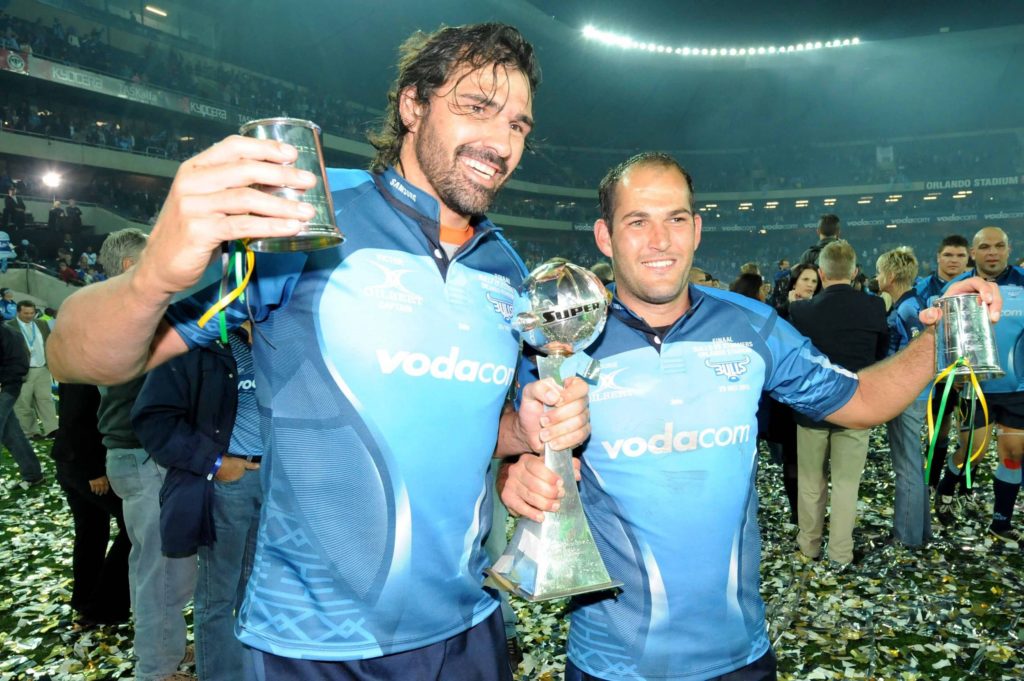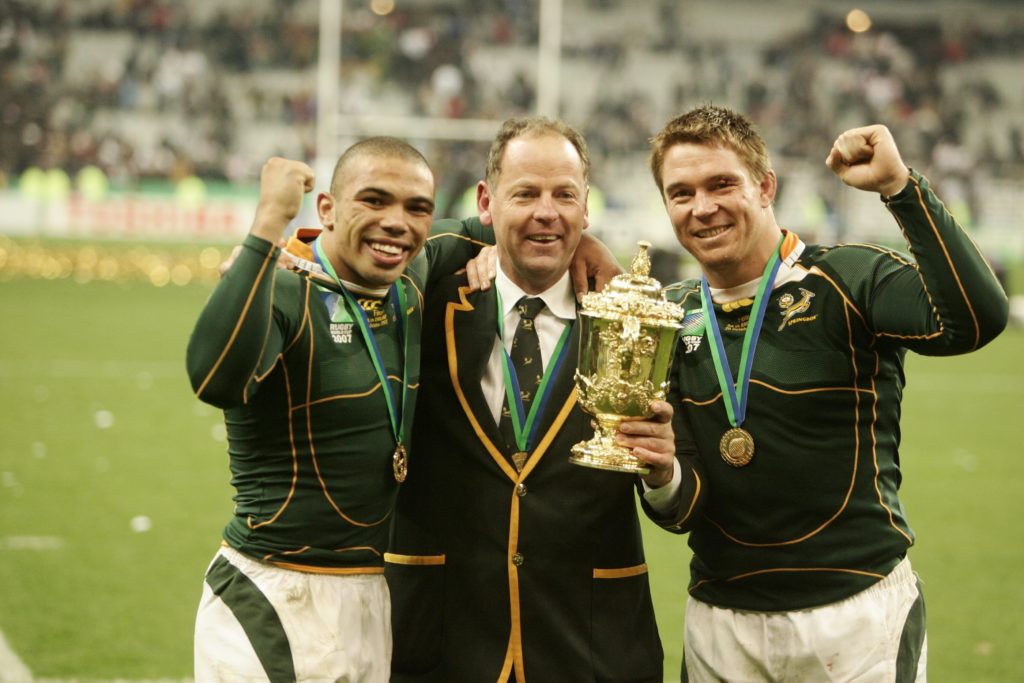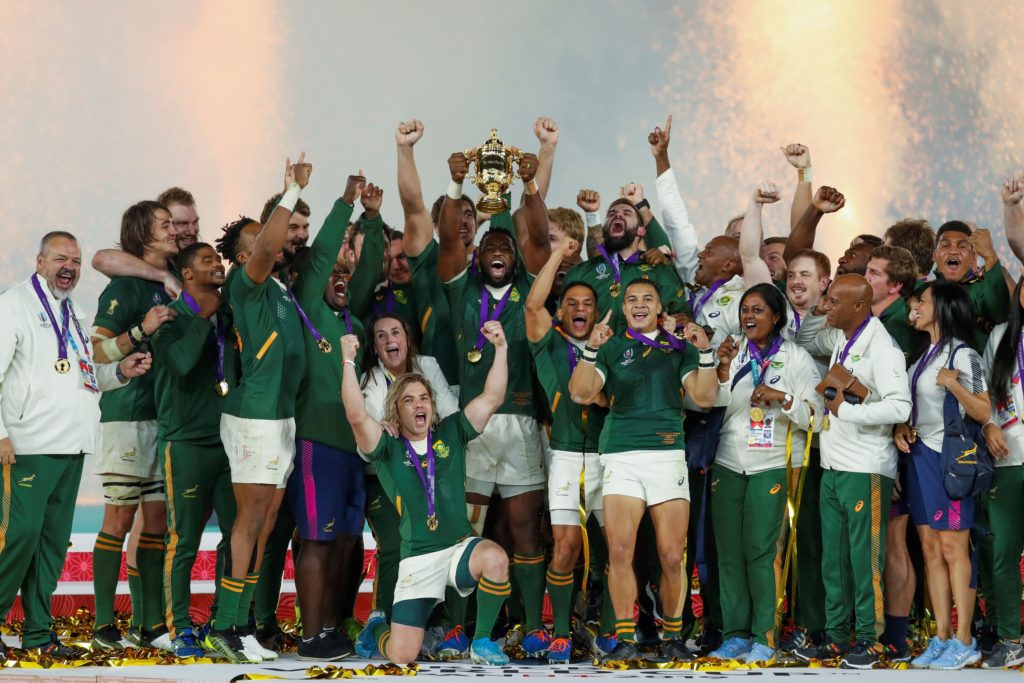The Currie Cup final was both a mess and a success. The decider between the Bulls and Sharks was staged in an empty stadium due to Covid-19 protocols. Lightning interrupted the match midway through the first half. The game would have ended on time if not for some particularly poor goal-kicking under pressure.
That said, the significance of the 100-minute contest cannot be overstated. The Bulls showed remarkable unity and character to claw their way back after trailing by 10 points. As the end of extra-time approached, they held the ball through 18 phases and scored the title-clinching try.
Captain Duane Vermeulen and several others dropped to their knees to savour the achievement. Wing-turned-inside-centre Cornal Hendricks led the team in a song, while Springbok prop Trevor Nyakane busted out his most elaborate dance moves. The evergreen Morné Steyn, who started at fly-half the last time the Bulls won the Currie Cup title in 2009, closed his eyes and raised his hands to the sky.
The long wait for a domestic title was over. The beginning of a new chapter in South African rugby history, and possibly a new Bulls dynasty, was well underway.
The Bulls brand was synonymous with excellence… Everyone in South African rugby wanted to be part of that set-up.
The Bulls used to be one of the best clubs on the planet. Under coach Heyneke Meyer, they won four Currie Cup titles between 2002 and 2006 as well as South Africa’s inaugural Super Rugby title in 2007. After Frans Ludeke succeeded Meyer, a team stacked with 2007 World Cup-winning Springboks went on to win the 2009 Currie Cup as well as back-to-back Super Rugby titles in 2009 and 2010.
The Bulls brand was synonymous with excellence. The franchise’s junior structures were the envy of the rugby world. The administrators were among the best in the sport. Everyone in South African rugby wanted to be part of that set-up.

A team powered by galacticos such as Victor Matfield, Bakkies Botha and Fourie du Preez peaked in the 2010 Super 14. After the Bulls beat the Stormers 25-17 at the Orlando Stadium, Ludeke was asked, somewhat rhetorically, how the team could possibly get any stronger. Nobody at that press conference could have predicted that it would be 10 years before the Bulls won another major trophy.
The franchise lost a raft of top players and coaches over the next 18 months. A number of senior Springboks departed after the 2011 World Cup, while the bulk of the management team joined Meyer after he was appointed as South Africa head coach in early 2012. The powers-that-be failed to fill the void, and standards at the once mighty franchise began to drop.
The Bulls qualified for the Super Rugby play-offs on just three occasions between 2011 and 2019. They were even less successful on the domestic scene, progressing to one Currie Cup final in that period (2016).
Ludeke was eventually replaced by Nollis Marais in 2016. After Marais crashed and burned, most people felt that former All Blacks coach John Mitchell would set the team on the right course.
The Bulls blew hot and cold under Mitchell, though. After Mitchell joined the England coaching team in late 2018, Bulls assistant coach Pote Human was asked to do an ambulance job. The Bulls punched above their weight in the 2019 season, but fell at the first play-off hurdle. When the 2020 Super Rugby season was suspended due to the Covid-19 crisis, the Bulls were ranked 12th in the 15-team tournament after seven rounds.
The administration as well as the coaching and playing groups have undergone a necessary transformation.
It’s important to reflect on where this franchise has been to understand just how far it has come. It may be some time yet before the current side can be compared to the great team of the late 2000s. Indeed, nobody is about to compare the recent victory in the Super Rugby Unlocked series with the previous successes in a Super Rugby tournament that included the best teams from Australia and New Zealand. And yet, given the profound changes that have been made in recent months, there’s certainly reason to believe that the best may be yet to come.
The administration as well as the coaching and playing groups have undergone a necessary transformation. In the past, many former and current players bemoaned the mismanagement of high performance manager Xander Janse van Rensburg. In December 2020, Janse van Rensburg was convicted on 13 counts of fraud and sentenced to three years in prison.
The Bulls have since recruited a new MD in Edgar Rathbone and it’s been plain to see that they have struck out in a new direction. Local billionaires Patrice Motsepe and Johann Rupert have bought a controlling stake in the franchise. World Cup-winning coach Jake White was appointed as director of rugby in April 2020, and immediately began to clean house.

While social media erupted with one-liners and memes about White applying for yet another top job, the decorated coach went about building the most balanced team in the country. Veterans plying their club trade overseas such as Vermeulen, Gio Aplon, Arno Botha, Nizaam Carr, Marcel van der Merwe, Jacques van Rooyen and more recently Marcel Coetzee were brought into the Bulls mix. White leaned on other Boks such as Nyakane and Jason Jenkins, as the team worked hard to re-establish their fearsome forward reputation. Steyn, at the ripe old age of 36, was backed as the franchise’s first-choice fly-half.
That’s not to say that White depended on older players or that he wasn’t afraid to experiment. Rookies such as full-back David Kriel, flanker Elrigh Louw and utility forward Sintu Manjezi were backed alongside more experienced players. Former Springbok wing Hendricks – who fought back from a life-threatening heart ailment several years ago – was paired with the Blitzbok Stedman Gans to form a potent midfield. When Gans was ruled out due to injury in the Currie Cup play-offs, White took a gamble and started scrum-half Marco Jansen van Vuren at No13.
White’s player-management formula as well as a tried-and-tested game plan has brought him success throughout his career. The Boks boasted a well-balanced squad at the 2007 World Cup, with promising youngsters like Frans Steyn playing alongside dependable veterans like Os du Randt and Percy Montgomery. White ensured that his team travelled to that tournament fit and prepared to outlast the world’s best. He tailored the game plan to harness South Africa’s physical strengths. The Boks left France with the Webb Ellis Trophy and their reputation well and truly enhanced.
There are parallels between what White achieved with the Boks and what he has achieved in his first season with the Bulls – the latter some 14 years later. The Bulls were a laughing stock at the beginning of 2020. After returning to a more traditional approach, and after harnessing the running strengths of their gifted back division, they have regained their intimidating reputation. What’s more, they have proved that they can perform under pressure and win trophies.
The Bulls, like the Boks, have prioritised the set-pieces and the collisions. They’ve instructed their half-backs to convert forward dominance into territorial gains.
Vermeulen made an interesting point recently when he was asked by The XV to compare the rise of the Bulls in 2020 and 2021 with the rise of the Boks in 2018 and 2019. Rassie Erasmus, of course, took charge of the South African side at a time when they sat at seventh in the World Rugby rankings. That team went on to beat the All Blacks in New Zealand several months later. The following year, a rejuvenated Bok side that boasted all the traditional menace as well as a new attacking edge won the Rugby Championship and the World Cup in Japan.
Vermeulen believes that there are similarities between the two groups, and indeed similarities between the coaches White and Erasmus. The Bulls, like the Boks, have prioritised the set-pieces and the collisions. They’ve instructed their half-backs to convert forward dominance into territorial gains. There has been a new focus on defence, and that has led to counter-attacking opportunities and some wonderful tries against the run of play.

White has looked to develop a wider squad that can maintain its effort over the course of a tournament and indeed a challenging season that will culminate in PRO16 participation. The recent Currie Cup final highlighted the power of the collective, as all 23 players were needed to get the team home over the course of 100 gruelling minutes. The depth of the squad will certainly be a plus during a lengthy and uniquely demanding PRO16 tournament.
The strong culture within the team has also been patent. In the Currie Cup final, White made the big call to take Steyn off shortly before the end of regular time. Steyn’s replacement Chris Smith went on to miss two attempts at goal. What was interesting to see, however, was Steyn shouting encouragement from the sideline and instructing his protege to shake off the disappointment. Smith eventually bounced back in the latter stages of extra-time. It was a stunning example of what this new group represents.
Du Preez openly criticised the previous administration and declined to get involved. More recently, he has accepted White’s offer to work with the team as a consultant. The great Bok scrum-half clearly believes that something special is happening at the franchise and that this team could scale greater heights in the years to come.
The Covid-19 crisis has disrupted the season and put teams under pressure like never before. The Bulls have coped remarkably well and have shown the necessary determination and composure needed to win big matches. While it’s worth pointing out that the Super Rugby Unlocked series as well as the subsequent Currie Cup were domestic tournaments, the progress of the Bulls during this period should not be discounted. Indeed, they may surprise some of the better European teams when they compete in the Rainbow Cup and PRO16.
These are exciting times for the Bulls, who appear well placed to take their revival to the next level. The giant of South African rugby is awake after a long slumber, and will take some stopping when it begins its rampage across the United Kingdom and Europe.
More stories from Jon Cardinelli
If you’ve enjoyed this article, please share it with friends or on social media. We rely solely on new subscribers to fund high-quality journalism and appreciate you sharing this so we can continue to grow, produce more quality content and support our writers.



Comments
Join free and tell us what you really think!
Sign up for free